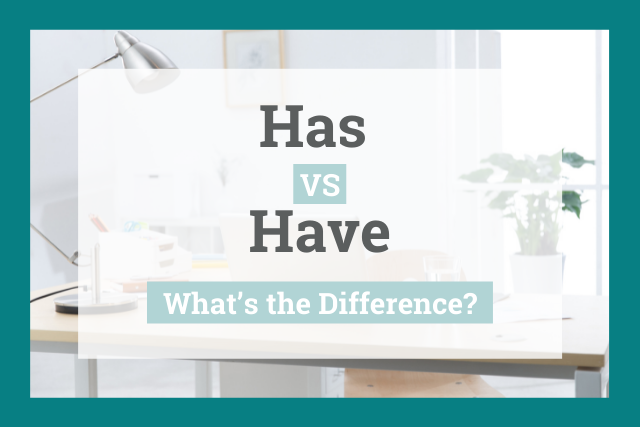
The verb to have is an irregular verb, which means that it is conjugated differently than most verbs in the English language.
Has and have are two conjugations of to have, so when should you use each?
The short answer is that you should use has with the third person singular, and have in almost all other cases.
This article will explain the difference between have vs has in more detail and help you remember how to use these words in your writing.
What’s the Difference Between Has and Have?
Has and have are two forms of the infinitive verb “to have,” which means “to possess, own, or hold.”
The two conjugations mean the same thing, but which form you use depends on the subject of the sentence.
You should use has with singular third person subjects, which are the pronouns he, she, and it.
You should use have with all other subjects, including the pronouns I, we, you, and they.
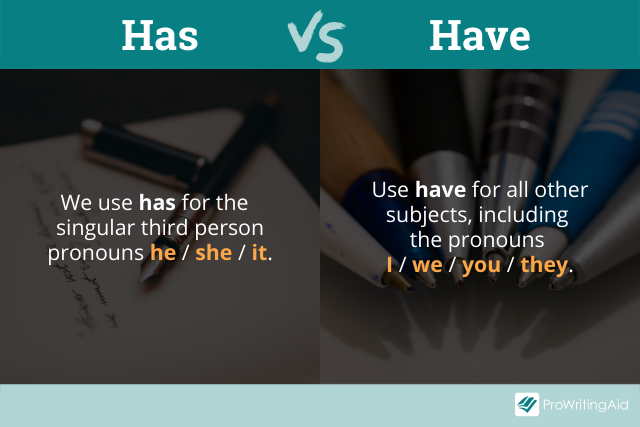
How Do You Use Have?
Have is the most common conjugation of to have.
You should use have when the subject of the sentence is first person (I, we), second person (you), or third person plural (they).
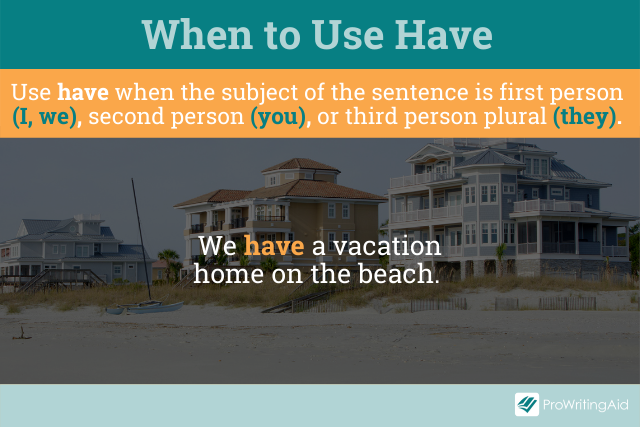
Here are some examples of have in a sentence:
- I have to go to the bathroom.
- You have no idea how hard I worked on this project.
- We have to get home before nine o’clock.
- My children, Bobby and Jerry, have very different personalities.
- People have always told me I have a pretty smile.
How Do You Use Has?
Has is the conjugation of to have when you’re working with the third person singular (he, she, and it).
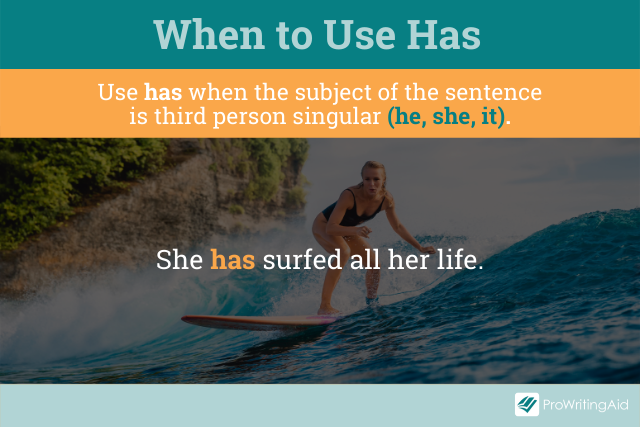
The same is true if you’re using people’s names or descriptions instead of pronouns, since that still counts as third person singular.
Here are some examples of has in sentences:
- He has an enormous apartment.
- She has the best grades in my whole class.
- Captain von Trapp has seven children.
- The woman in the white dress has a cute dog.
- That idea has already been suggested.
Examples of Using Have vs Has Correctly
Let’s look at some examples of have and has in English literature.
Examples of Has
“After she has left you I will still be here, making her laugh. My light shining in her. I will still be here long after she has forgotten your name.”—Patrick Rothfuss, The Name of the Wind
“Fiona has the same glacial beauty of an iceberg, but unlike the iceberg she has absolutely nothing below the surface.”—Roald Dahl, Matilda
“By now, the rain has slowed from pounding fists to the soft, infrequent tapping of bored fingers.”—V.E. Schwab, Gallant
“Where does a mistake begin? Lately I’ve found this simple question difficult. Impossible, actually. A mistake has roots in both time and space—a person’s reasoning and her whereabouts.”—Amity Gaige, Sea Wife
“This word, which has no equivalent in English, has been translated as ‘to love for the last time.’”—Sigrid Nunez, What Are you Going Through
“There is exquisite lightness in waking each morning with the knowledge that the worst has already happened.”—Emily St. John Mandel, The Glass Hotel
“Every woman I’ve ever met who has had a divorce has a story to explain herself. But in real life the story and actual reasons for the divorce diverge.”—Torrey Peters, Detransition, Baby
Examples of Have
“You don’t have a soul, Doctor. You are a soul. You have a body, temporarily.”—Walter M. Miller Jr., A Canticle for Leibowitz
“When I have a house of my own, I shall be miserable if I have not an excellent library.”—Jane Austen, Pride and Prejudice
“It's so hard to forget pain, but it's even harder to remember sweetness. We have no scar to show for happiness. We learn so little from peace.”—Chuck Palahniuk, Diary
“Sometimes you have to be apart from people you love, but that doesn't make you love them any less. Sometimes you love them more.”—Nicholas Sparks, The Last Song
“It’s easy to forget, when you’re missing someone, that they’re more than just the person you remember: they have sides to themselves they only show when other people are around.”—Beth O’Leary, The Switch
“This is your CV? What have you been doing with your life?”—Cho Nam-Joo, Kim Ji-young, Born 1982
“Let me tell you this: if you meet a loner, no matter what they tell you, it's not because they enjoy solitude. It's because they have tried to blend into the world before, and people continue to disappoint them.”—Jodi Picoult, My Sister’s Keeper
Tricky Cases for Has vs Have
Occasionally, you’ll come across a complex case that isn't as straightforward as the ones we’ve talked about so far. Here are two of the most common cases to watch out for.
Who Has or Who Have?
Here’s a trickier situation. Should you say who has or who have?
In this case, it depends on who you’re talking about. If you’re talking about a singular object, you should use who has. If you’re talking about a plural object, you should use who have.
For example, you would say “I’m looking for a woman who has a cute corgi puppy.” Has is correct because “a woman” is a singular object.
On the other hand, you would say “I’m looking for three men who have betrayed my family.” Have is correct because “three men” is a plural object.
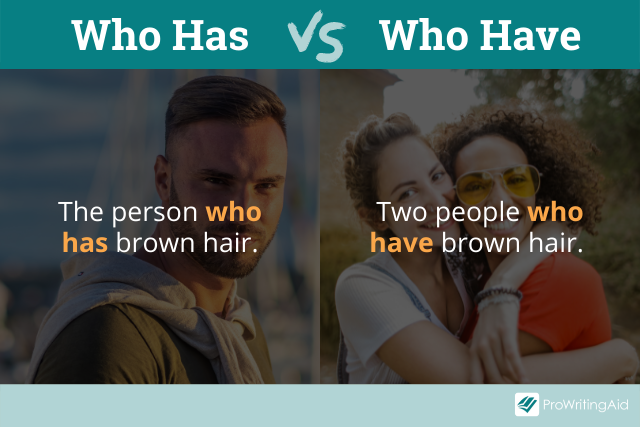
There Have or There Has?
What about there have vs there has?
In this case, the correct word depends on the object of the sentence. There has is used for singular objects, and there have is used for plural objects.
For example, you would say “There have been many reasons to delay the wedding.” Have is correct because “many reasons” is a plural object.
On the other hand, you would say “There has been an unforeseen event, which means we must delay the wedding.” Has is correct because “an unforeseen event” is a singular object.
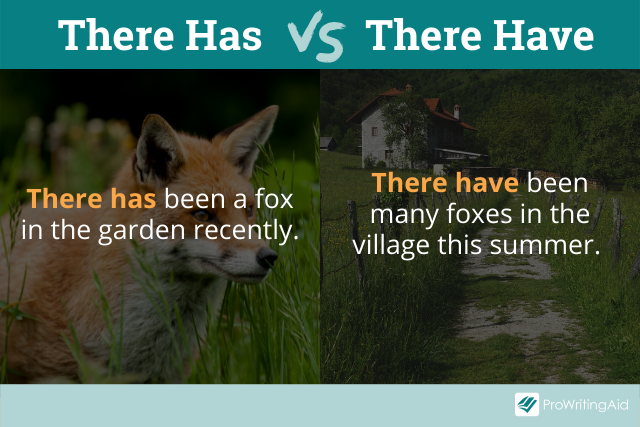
Conclusion on Has vs Have
Now you know the difference between has and have! Let’s do a quick recap.
Use has when you’re using the pronouns he, she, and it.
Use have when you’re using the pronouns I, we, you, and they.
In special cases like who has vs who have and there has vs there have, use has for singular objects and have for plural objects.


